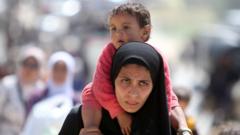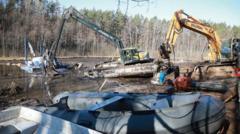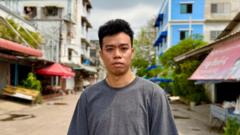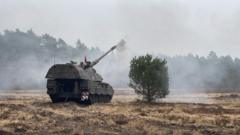**In the aftermath of a devastating earthquake that has claimed over 1,600 lives, Myanmar’s ruling military junta persists with military operations, prompting calls for an urgent cessation of violence from international observers and local leaders.**
**Myanmar Junta's Continued Air Strikes Amid Earthquake Tragedy Raises International Outcry**

**Myanmar Junta's Continued Air Strikes Amid Earthquake Tragedy Raises International Outcry**
**As Myanmar reels from a massive earthquake, the military junta's air strikes provoke global condemnation and raise humanitarian concerns.**
Myanmar is facing intensified conflict as its military junta continues air strikes even after a catastrophic earthquake struck, killing over 1,600 individuals. The United Nations has condemned the ongoing assaults, labeling them “completely outrageous and unacceptable.” Special Rapporteur Tom Andrews expressed disbelief at the regime’s actions, emphasizing the need for the military to cease operations immediately to allow for rescue efforts post-earthquake.
Pro-democracy groups, fighting against the military regime that has held power since a coup nearly four years ago, reported continued aerial bombardments. The earthquake, which registered a magnitude of 7.7, particularly affected the northwestern Sagaing region, where significant destruction has been reported. To address the humanitarian needs in the wake of this disaster, the National Unity Government (NUG), representing the deposed civilian government, announced a two-week suspension of offensive military actions in regions impacted by the quake, albeit with a provision for defensive measures.
The seismic event, felt in neighboring countries, has added complexity to an already volatile situation in Myanmar. Since the coup, the country has been embroiled in civil strife as the military has faced relentless resistance from various pro-democracy and ethnic groups, leading to extensive fighting. As a result, large regions, including the earthquake's epicenter, are now controlled by these resistance factions.
A recent BBC investigation reveals that the junta, having lost significant territory, controls less than a quarter of Myanmar. In contrast, pro-democracy and ethnic forces command approximately 42% of the country, leading the military to increasingly resort to air power to suppress opposition. This military strategy often results in tragic attacks on civilian targets, as past airstrikes have indiscriminately claimed countless innocent lives.
Human rights organizations, including UN bodies monitoring violations, are accusing the junta of committing severe human rights abuses and war crimes. This violence is sustained largely due to continued support from Russia and China, who have been supplying military aid including advanced weaponry, despite international calls for an arms embargo following the coup.
There is rising apprehension regarding the military’s potential exploitation of humanitarian aid following the earthquake. The junta has a history of obstructing relief efforts, often directing aid solely to areas under their control while denying access or aid to regions where resistance groups operate. Observers expect this pattern to continue, exacerbating the humanitarian crisis for those most in need following the disaster.
In conclusion, as the international community grapples with the situation, the humanitarian impact of both the earthquake and ongoing military operations keeps growing more severe, highlighting the urgent need for action and support for Myanmar’s civilians during this dual crisis.























